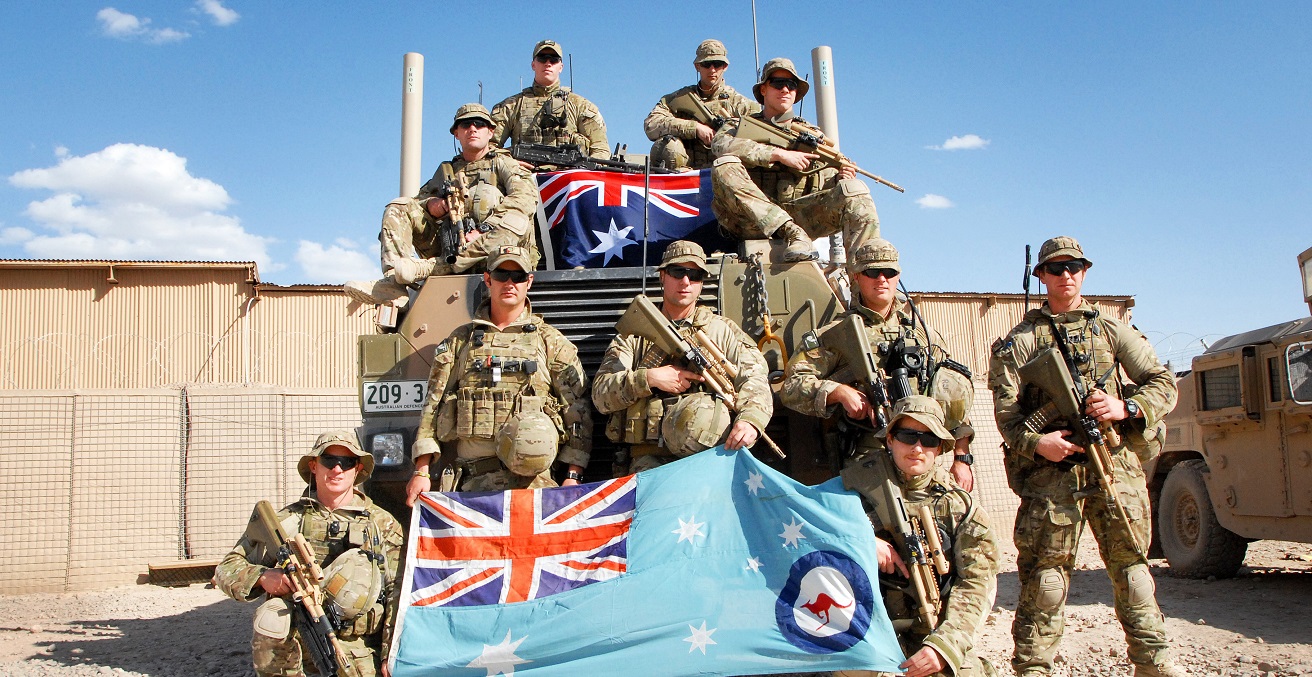
We Urgently Need a Real National Security Review
Michael Pascoe / The New Daily
AUSTRALIA (May 27, 2023) — For all the effort of current Labor and LNP politicians to talk tough and spend big on defence, wrapping themselves in the flag, ANZAC mythology and the political cowardice of bipartisanship, they don’t even have a national security strategy.
If you accept Defence Minister Richard Marles’ declaration that “there is no more important and consequential task for Government than protecting the security, interests and livelihoods of its people”, this is a monumental failure.
Oh yes, there was that quickie rubber-stamp Defence Security Review(DSR) knocked up on the back of a submarine sales brochure, but even a genuine DSR should only be part of a real national security strategy and should flow from it.
Without the guidance of a national security strategy, the Albanese Government’s DSR, severely compromised by foreign influence and political imperatives, threatens to be positively dangerous for Australia.
That’s not just a claim being made by some TND columnist, but my distillation of the very considered opinion of Major General Michael Smith in a 5,000-word paper on how Australia should defend itself in the 21st century, subtitled Silencing the Drums of War and Muzzling the Dogs of War.

Expert Paper Available
Major General Smith served in the ADF for 34 years, his final role being UN Deputy Force Commander in Timor-Leste. He has continued to serve with distinction in numerous roles since retiring from the army, including as CEO of Austcare, founding executive director of the Australian Civil-Military Centre, president of the United Nations Association of Australia, and at ANU and Griffith University.
His experience brings a considered military and civil eye to security.
With the general’s permission, The New Daily is publishing his full paper here as a contribution to the growing civil society debate and concern about Australia’s charge down the Scott Morrison defence path.
Our national security is a much bigger and more far-reaching issue than AUKUS and assisting the US in containing China. As Major General Smith writes in part:
“Devising a National Security Strategy is no easy task. While our strategic objectives (key objectives include the maintenance of territorial integrity and sovereignty; maintenance of a stable, prosperous and externally focused economy; a stable and prosperous neighbourhood; and global agency commensurate with our power and influence) remain relatively constant over time, a comprehensive national security strategy is shaped and influenced by myriad domestic and international circumstances that change over time.”
Security Challenges
“Australia’s security challenges are headlined by the likelihood of war or serious conflict between the United States and China (and/or their proxies). But our nation’s security is jeopardised further by nuclear proliferation, the likelihood of global economic recession or depression, protracted ecological threats impacted further by climate change, the continuing threat of terrorism, mass population displacement and movement caused by conflicts and ecological disasters, and the exponential growth in artificial intelligence (AI) in the absence of effective regulation, particularly to control lethal autonomous weapons systems (LAWS).
“Many nations, including our major allies, have a National Security Strategy that sets the benchmark for more detailed subordinate policies. The best of these strategies connects domestic realities with global trends to provide the most feasible approach to reduce risk and enhance national resilience and prosperity. Defence is but one important pillar of national security, but successive Australian governments have tended to use Defence and National Security both interchangeably and with ambiguity.
“Defence policy should not masquerade as national security policy and it should not be determined or articulated in isolation from other national security challenges. To do so, as evidenced by the recent DSR, is to put the cart before the horse.”
Just as Georges Clemenceau warned that war was too important to be left to the generals, Major General Smith argues a broad consultation is required for our national security.
Effective and ongoing consultation with civil society – including representatives from business, industry, academia, think tanks and First Nations people – is particularly important.
Defence Minister Richard Marles says the relationship with China is a delicate balancing act.
This is because the consequences of a National Security Strategy are far too important to be determined by a handful of politicians, consultants, senior bureaucrats, spooks and military officers.
He is dismissive of decisions by the Morrison and Albanese governments being made without public or parliamentary debate.
Price of Bipartisanship
Indeed, the misguided predilection of our parliamentarians to adhere to a bipartisan approach on national security issues has proved counter-productive for the prospects of peace.
Bipartisanship is not an end in itself. Our political system operates on the basis of an adversarial system pitting the Government of the day against the “Loyal Opposition”. Bipartisanship is the consequence of agreement on good policy. When pursued for its own sake, it becomes a fools’ journey delivering the lowest common denominator.
The AUKUS agreement heralded by the former government was reached in secret, even from most ministers and with no public consultation. Former prime minister Scott Morrison boasted that AUKUS was the most important defence agreement since the ANZUS Treaty. He even gloated about how clever he was to keep it secret.
And then our current Prime Minister Anthony Albanese followed through without public consultation, avoiding being politically wedged because of the ALP’s lack of a coherent national security policy before coming to office.
(Aside from Mr Albanese’s overnight adoption of AUKUS when Mr Morrison sprung the stunt on him, it seems shadow cabinet was given just 30 minutes to fall into line.)
Key Questions
Major General Smith poses four questions to better shape Australia’s national security and defence preparedness, believing sensible answers should at least diminish, if not silence, the drums of war.
- First question: Do we need an open conversation on national security leading to a National Security Strategy before implementing all the significant recommendations in the Defence Security Review?
- Second question: What key actions should we consider to avert, or at least diminish, the likelihood of war with China?
- Third question: Should we reappraise and recalibrate our current relationship with the United States?
- Fourth question: Do we need to reshape our current Defence Strategy? Please note that this question, correctly in my view, is subordinate to the other questions.
To explore those questions and Major General Smith’s answers, you need to read his paper, but his short answer to the first one is “yes” as Government has been captured by its intelligence and security advisors.
We desperately need a broader national security conversation that identifies the nation’s policy objectives rather than simply reacting to so-called intelligence assessments. Intelligence is a test of policy, not its driver.
US Influence ‘Too Pervasive’
On the constant scaremongering over China vs America, he makes a strong case for our national security being enhanced by our calling for restraint and not taking sides – unlike the standard Canberra/Washington line.
Along with New Zealand, the US should remain our closest defence partner, but, he writes:
“US influence over Australia’s defence and strategic thinking has become far too pervasive and influential, eroding Australia’s independent agency and our sovereignty. Together with reinvigoration of the QUAD, these security arrangements in servitude to the US’s mission to contain China have had two additional negative impacts on Australia’s national security:
- Our neighbours throughout the Indo-Pacific infer that Australia is primarily an appendage of the United States – the ‘Deputy Sheriff’ label – determined to contain and contest China’s rise at any cost, including by jeopardising Australia’s and the region’s future economic prosperity; and
- Through AUKUS and the QUAD Australia is actively contributing to a major arms race, including potential nuclear proliferation, in the very region that we and most other inhabitants would prefer remain a nuclear-free zone of peace.”
As for the Subs
As for the DSR and those expensive submarines:
“The Chinese strategist Sun Tzu correctly observed that ‘invincibility lies in the defence’. Australia would be very wise to adhere to this tenet. How a nation postures itself largely influences the threats it attracts. The DSR charts a very different course, being offensive rather than defensive in nature and clearly choosing China as our adversary.
In my view this decision to procure nuclear-powered submarines will prove to be as useless, but even more costly, than was our flawed Singapore strategy before World War II.”
But don’t take my summary’s word for it.
Read the paper with an open mind to the deficiencies of government subservient to foreign interests.
The combination of Anthony Albanese effectively silencing dissent within Labor and ALP/LNP bipartisanship means it is up to civil society to fill the debate vacuum.
It is indeed too important to be left to politicians, American admirals and spooks.
Posted in accordance with Title 17, Section 107, US Code, for noncommercial, educational purposes.




